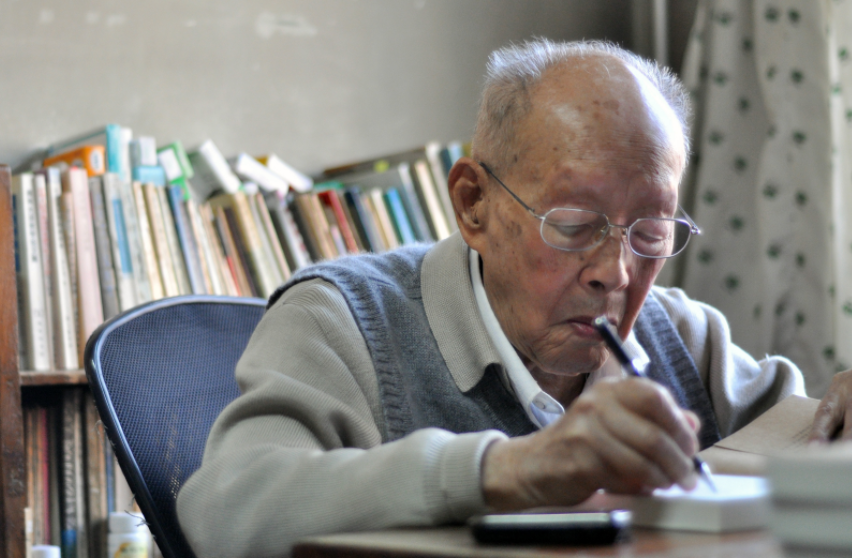Who Is Zhou Youguang?? "Google Doodle Today"

STORY
Zhou enrolled the same year in St. John's University, Shanghai where he majored in economics and took supplementary coursework in linguistics. He was almost unable to attend due to his family's poverty, but friends and relatives fundraised 200 yuan for the admission fee, and also helped him pay for tuition. He left during the May Thirtieth Movement of 1925 and transferred to Guanghua University, from which he graduated in 1927.
On 30 April 1933, Zhou married Zhang Yunhe (张允和), and the couple went to Japan for Zhou's studies. Zhou started as an exchange student at the University of Tokyo, later transferring to Kyoto University due to his admiration of the Japanese Marxist economist Hajime Kawakami, who was a professor there at the time. Kawakami's arrest for joining the outlawed Japanese Communist Party in January 1933, however, meant that Zhou could not be his student. Zhou's son, Zhou Xiaoping (周晓平), was born in 1934. Later, the couple also had a daughter, Zhou Xiaohe (周小禾).[6]
In 1937, due to the outbreak of the Second Sino-Japanese War, Zhou and his family moved to the wartime capital Chongqing, and his daughter died. He worked for Sin Hua Bank before entering public service as a deputy director at the National Government's Ministry of Economic Affairs, agricultural policy bureau (经济部农本局). After the 1945 Japanese defeat in World War II, Zhou went back to work for Sin Hua where he was stationed overseas: first in New York City and then in London. During his time in the United States, he met Albert Einstein twice.
Zhou participated for a time in the China Democratic National Construction Association, but when the People's Republic was established in 1949 he returned to Shanghai, where he taught economics at Fudan University for several years.
In 1955, the government placed Zhou at the head of a committee to reform the Chinese language to increase literacy. While other committees oversaw the tasks of promulgating Mandarin Chinese as the national language and creating simplified Chinese characters, Zhou's committee was charged with developing a romanization to represent the pronunciation of Chinese characters. Zhou said the task took about three years, and was a full-time job. Pinyin was made the official romanization in 1958, although (as now) it was only a pronunciation guide, not a substitute writing system. Zhou based Pinyin on several preexisting systems: the phonemes were inspired by Gwoyeu Romatzyh of 1928 and Latinxua Sin Wenz of 1931, while the diacritic markings representing tones were inspired by zhuyin.
In April 1979, the International Organization for Standardization (ISO) in Warsaw held a technology conference. Speaking on behalf of the People's Republic of China, Zhou proposed the use of the "Hanyu Pinyin System" as the international standard for the spelling of Chinese. Following a vote in 1982 the scheme became ISO 7098.
In the modern era Pinyin has largely replaced older romanization systems such as Wade-Giles.It is the principal vehicle for most Chinese language computer input.
During the Cultural Revolution, Zhou was sent to live in the countryside and to be "re-educated", as were many other intellectuals at that time. He spent two years at a labour camp.
After 1980, Zhou worked with Liu Zunqi and Chien Wei-zang on translating the Encyclopædia Britannica into Chinese, earning him the nickname "Encyclopedia Zhou". Zhou continued writing and publishing after the creation of Pinyin; for example, his book Zhongguo Yuwen de Shidai Yanjin (中国语文的时代演进), translated into English by Zhang Liqing, was published in 2003 as The Historical Evolution of Chinese Languages and Scripts. From 2000, he wrote ten books, of which some have been banned in China.
In 2011, during an interview with NPR, Zhou said that he hoped to see the day China changed its position on the Tiananmen Square killings in 1989, an event he said had ruined Deng Xiaoping's reputation as a reformer. He became an advocate of political reform, and was critical of the Communist Party of China's attacks on traditional Chinese culture when it came into power.
In early 2013, both Zhou and his son were interviewed by Dr. Adeline Yen Mah at their residence in Beijing. Mah documented the visit in a video and presented Zhou with a Pinyin game she created for the iPad. Zhou became a supercentenarian on 13 January 2016 when he reached the age of 110. He was one of the few supercentenarians, along with Herman Smith-Johannsen, known for reasons other than their longevity.
Zhou died on 14 January 2017 at his home in Beijing, a day after his 111th birthday; no cause was given. His wife had died in 2002, and his son had died in 2015. At the time, he was the seventh-oldest known living man and the oldest known living person in China. He is one of the 100 world's verified oldest men in history.
Hi! I am a robot. I just upvoted you! I found similar content that readers might be interested in:
https://en.wikipedia.org/wiki/Zhou_Youguang